Report: The Key Elements That Define and Contribute to a Good Teacher
VerifiedAdded on 2023/06/11
|14
|3994
|114
Report
AI Summary
This research report delves into the essential qualities that define a good teacher, focusing on the application of teaching, learning, and assessment theories in practice, particularly within early childhood education. It incorporates a literature review of educational theorists like Dewey and Piaget, highlighting the shift towards participative learning environments and student-centered approaches. The report also examines different teaching styles, such as the VARK model, to understand individual learning preferences and enhance teaching effectiveness. Furthermore, it explores various motor learning theories and the influence of assessment practices in improving teacher performance and student growth. The methodology includes a positivism research philosophy with a deductive approach, employing interviews to gather data. Ultimately, the report aims to provide insights into creating effective learning experiences and fostering holistic development in young students, with the goal of shaping them into contributing members of society. Desklib provides access to this and many other solved assignments.
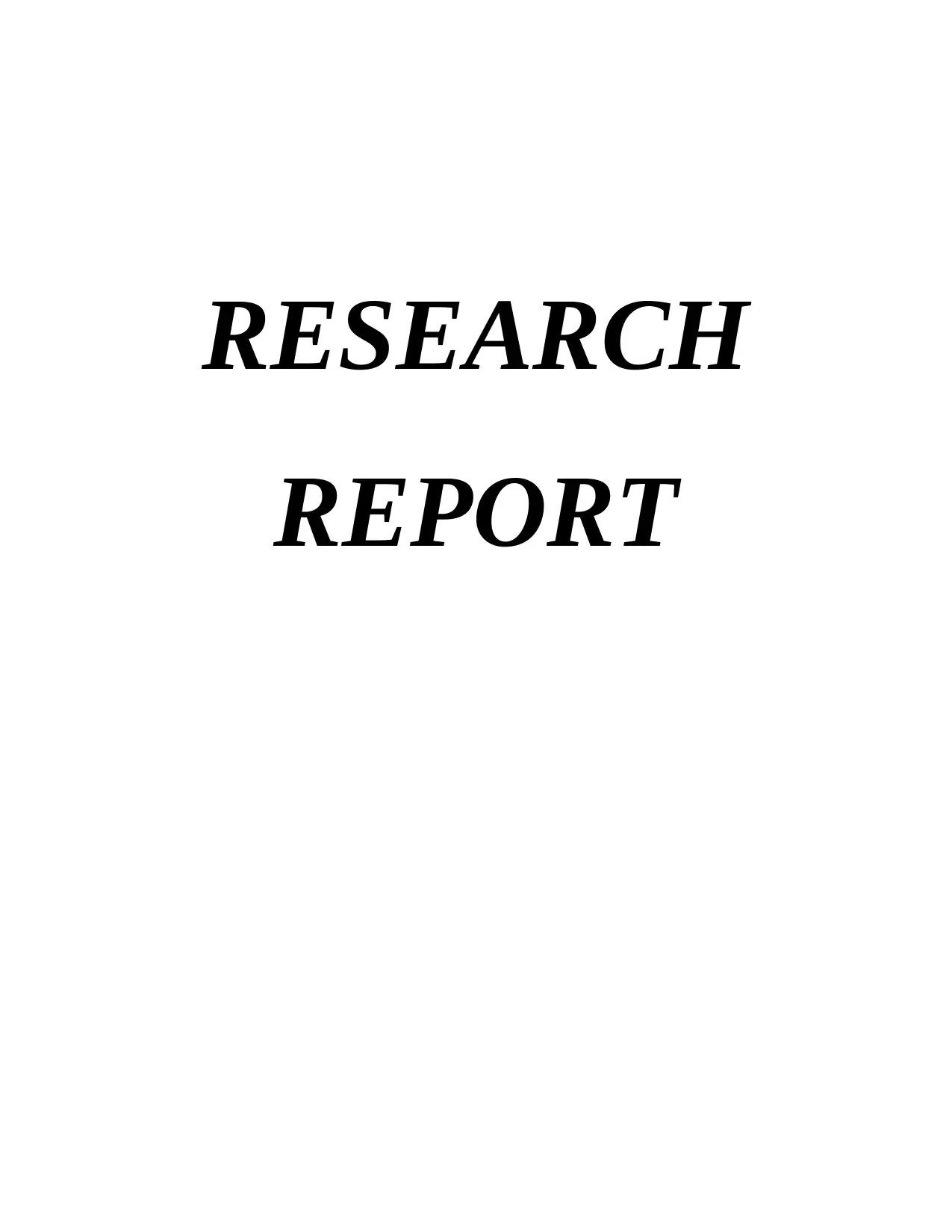
RESEARCH
REPORT
REPORT
Paraphrase This Document
Need a fresh take? Get an instant paraphrase of this document with our AI Paraphraser
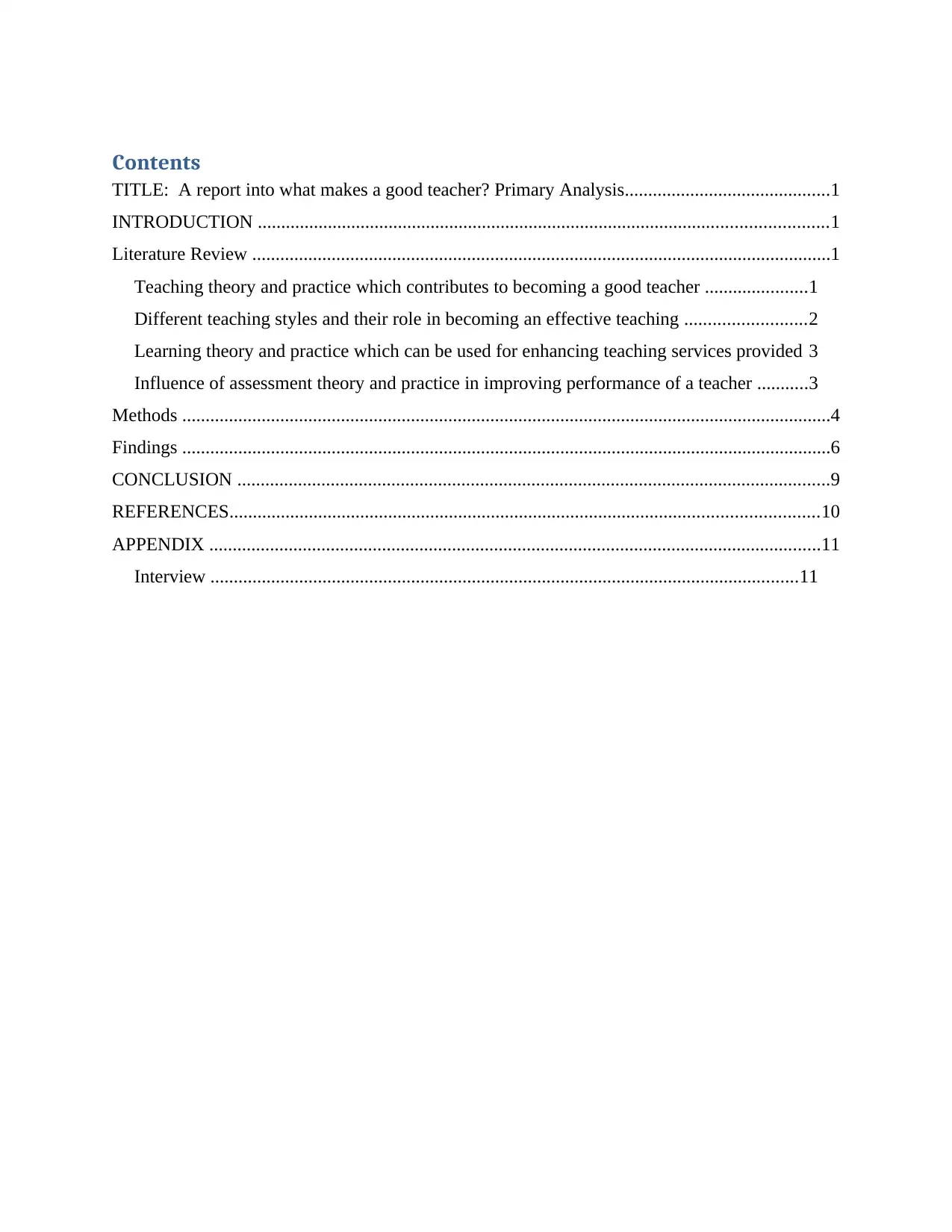
Contents
TITLE: A report into what makes a good teacher? Primary Analysis............................................1
INTRODUCTION ..........................................................................................................................1
Literature Review ............................................................................................................................1
Teaching theory and practice which contributes to becoming a good teacher ......................1
Different teaching styles and their role in becoming an effective teaching ..........................2
Learning theory and practice which can be used for enhancing teaching services provided 3
Influence of assessment theory and practice in improving performance of a teacher ...........3
Methods ...........................................................................................................................................4
Findings ...........................................................................................................................................6
CONCLUSION ...............................................................................................................................9
REFERENCES..............................................................................................................................10
APPENDIX ...................................................................................................................................11
Interview ..............................................................................................................................11
TITLE: A report into what makes a good teacher? Primary Analysis............................................1
INTRODUCTION ..........................................................................................................................1
Literature Review ............................................................................................................................1
Teaching theory and practice which contributes to becoming a good teacher ......................1
Different teaching styles and their role in becoming an effective teaching ..........................2
Learning theory and practice which can be used for enhancing teaching services provided 3
Influence of assessment theory and practice in improving performance of a teacher ...........3
Methods ...........................................................................................................................................4
Findings ...........................................................................................................................................6
CONCLUSION ...............................................................................................................................9
REFERENCES..............................................................................................................................10
APPENDIX ...................................................................................................................................11
Interview ..............................................................................................................................11
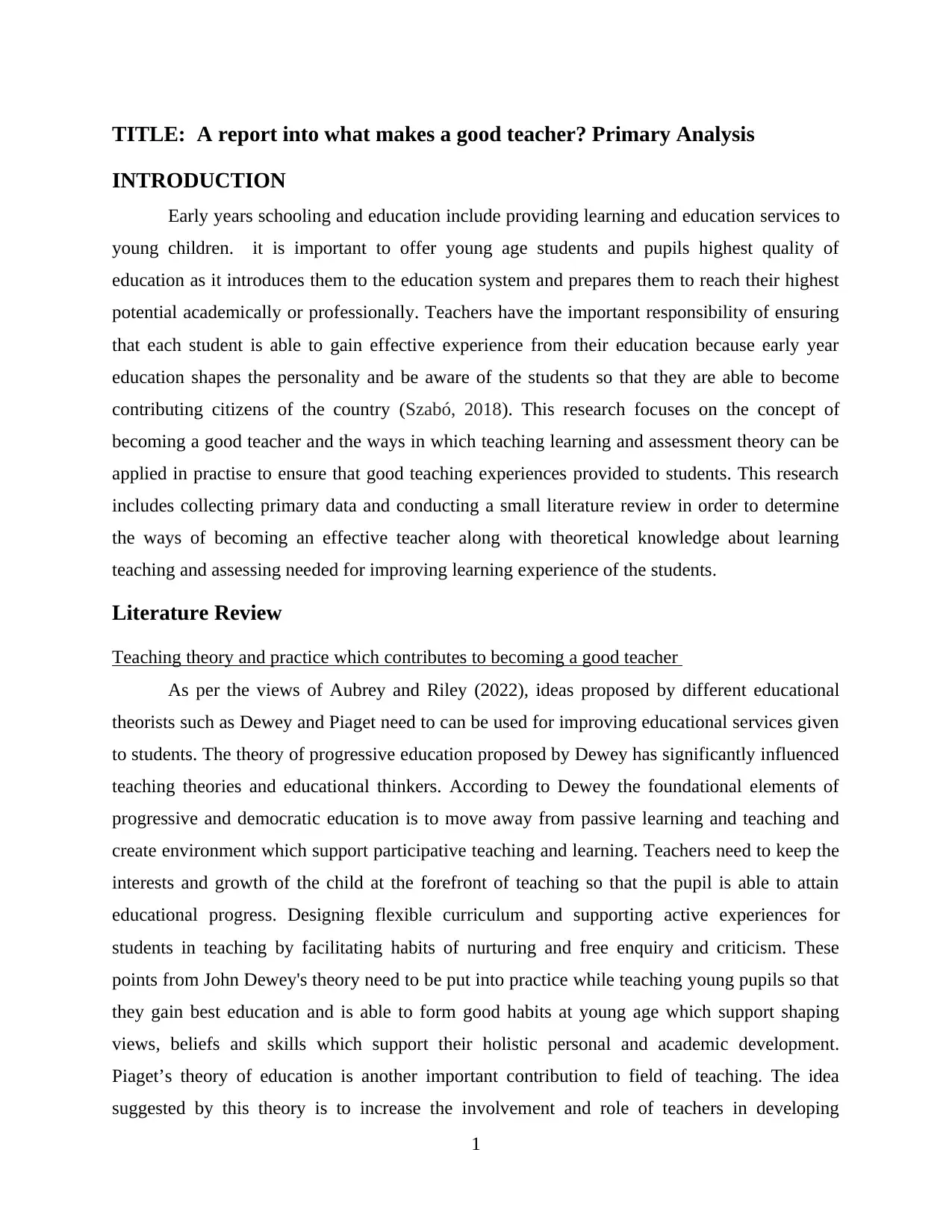
TITLE: A report into what makes a good teacher? Primary Analysis
INTRODUCTION
Early years schooling and education include providing learning and education services to
young children. it is important to offer young age students and pupils highest quality of
education as it introduces them to the education system and prepares them to reach their highest
potential academically or professionally. Teachers have the important responsibility of ensuring
that each student is able to gain effective experience from their education because early year
education shapes the personality and be aware of the students so that they are able to become
contributing citizens of the country (Szabó, 2018). This research focuses on the concept of
becoming a good teacher and the ways in which teaching learning and assessment theory can be
applied in practise to ensure that good teaching experiences provided to students. This research
includes collecting primary data and conducting a small literature review in order to determine
the ways of becoming an effective teacher along with theoretical knowledge about learning
teaching and assessing needed for improving learning experience of the students.
Literature Review
Teaching theory and practice which contributes to becoming a good teacher
As per the views of Aubrey and Riley (2022), ideas proposed by different educational
theorists such as Dewey and Piaget need to can be used for improving educational services given
to students. The theory of progressive education proposed by Dewey has significantly influenced
teaching theories and educational thinkers. According to Dewey the foundational elements of
progressive and democratic education is to move away from passive learning and teaching and
create environment which support participative teaching and learning. Teachers need to keep the
interests and growth of the child at the forefront of teaching so that the pupil is able to attain
educational progress. Designing flexible curriculum and supporting active experiences for
students in teaching by facilitating habits of nurturing and free enquiry and criticism. These
points from John Dewey's theory need to be put into practice while teaching young pupils so that
they gain best education and is able to form good habits at young age which support shaping
views, beliefs and skills which support their holistic personal and academic development.
Piaget’s theory of education is another important contribution to field of teaching. The idea
suggested by this theory is to increase the involvement and role of teachers in developing
1
INTRODUCTION
Early years schooling and education include providing learning and education services to
young children. it is important to offer young age students and pupils highest quality of
education as it introduces them to the education system and prepares them to reach their highest
potential academically or professionally. Teachers have the important responsibility of ensuring
that each student is able to gain effective experience from their education because early year
education shapes the personality and be aware of the students so that they are able to become
contributing citizens of the country (Szabó, 2018). This research focuses on the concept of
becoming a good teacher and the ways in which teaching learning and assessment theory can be
applied in practise to ensure that good teaching experiences provided to students. This research
includes collecting primary data and conducting a small literature review in order to determine
the ways of becoming an effective teacher along with theoretical knowledge about learning
teaching and assessing needed for improving learning experience of the students.
Literature Review
Teaching theory and practice which contributes to becoming a good teacher
As per the views of Aubrey and Riley (2022), ideas proposed by different educational
theorists such as Dewey and Piaget need to can be used for improving educational services given
to students. The theory of progressive education proposed by Dewey has significantly influenced
teaching theories and educational thinkers. According to Dewey the foundational elements of
progressive and democratic education is to move away from passive learning and teaching and
create environment which support participative teaching and learning. Teachers need to keep the
interests and growth of the child at the forefront of teaching so that the pupil is able to attain
educational progress. Designing flexible curriculum and supporting active experiences for
students in teaching by facilitating habits of nurturing and free enquiry and criticism. These
points from John Dewey's theory need to be put into practice while teaching young pupils so that
they gain best education and is able to form good habits at young age which support shaping
views, beliefs and skills which support their holistic personal and academic development.
Piaget’s theory of education is another important contribution to field of teaching. The idea
suggested by this theory is to increase the involvement and role of teachers in developing
1
⊘ This is a preview!⊘
Do you want full access?
Subscribe today to unlock all pages.

Trusted by 1+ million students worldwide
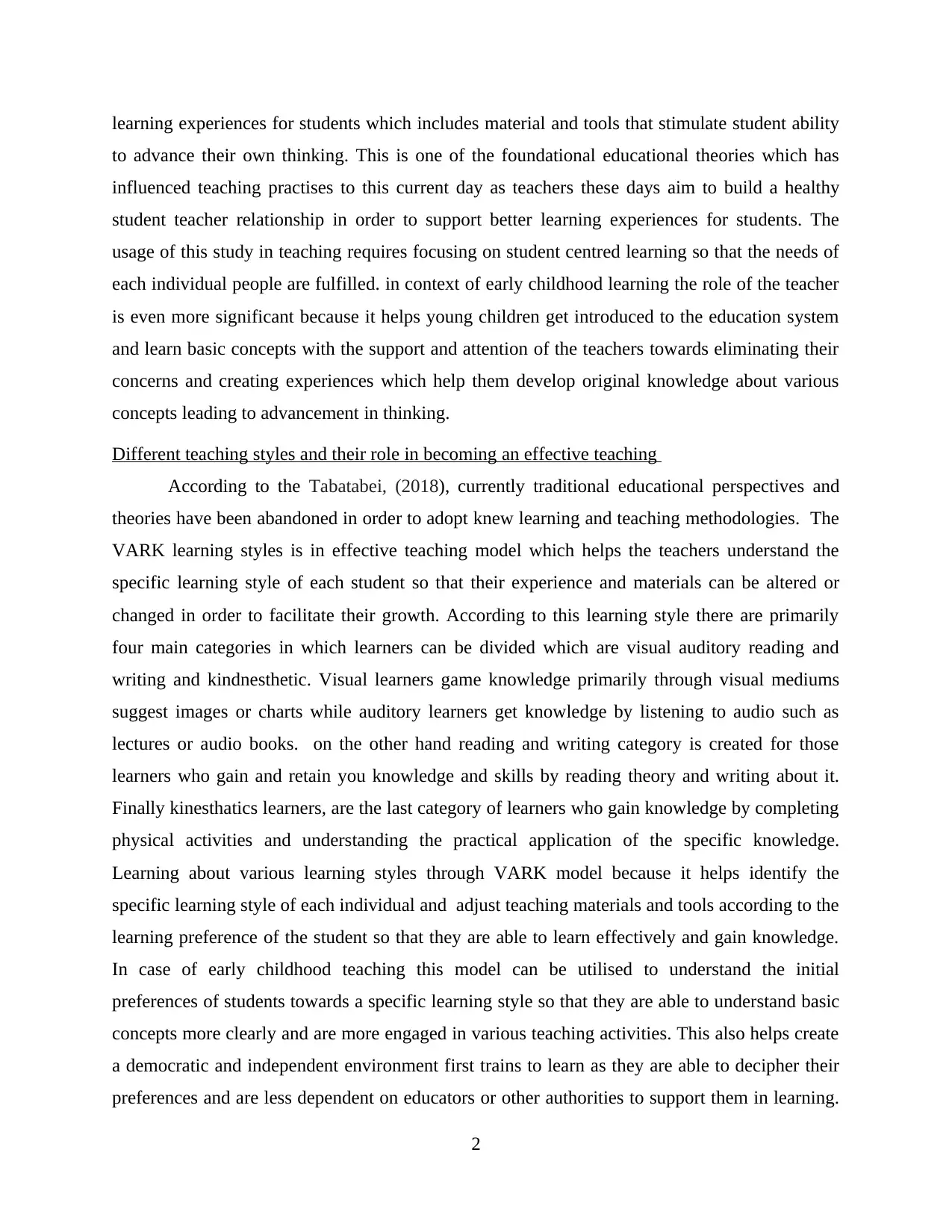
learning experiences for students which includes material and tools that stimulate student ability
to advance their own thinking. This is one of the foundational educational theories which has
influenced teaching practises to this current day as teachers these days aim to build a healthy
student teacher relationship in order to support better learning experiences for students. The
usage of this study in teaching requires focusing on student centred learning so that the needs of
each individual people are fulfilled. in context of early childhood learning the role of the teacher
is even more significant because it helps young children get introduced to the education system
and learn basic concepts with the support and attention of the teachers towards eliminating their
concerns and creating experiences which help them develop original knowledge about various
concepts leading to advancement in thinking.
Different teaching styles and their role in becoming an effective teaching
According to the Tabatabei, (2018), currently traditional educational perspectives and
theories have been abandoned in order to adopt knew learning and teaching methodologies. The
VARK learning styles is in effective teaching model which helps the teachers understand the
specific learning style of each student so that their experience and materials can be altered or
changed in order to facilitate their growth. According to this learning style there are primarily
four main categories in which learners can be divided which are visual auditory reading and
writing and kindnesthetic. Visual learners game knowledge primarily through visual mediums
suggest images or charts while auditory learners get knowledge by listening to audio such as
lectures or audio books. on the other hand reading and writing category is created for those
learners who gain and retain you knowledge and skills by reading theory and writing about it.
Finally kinesthatics learners, are the last category of learners who gain knowledge by completing
physical activities and understanding the practical application of the specific knowledge.
Learning about various learning styles through VARK model because it helps identify the
specific learning style of each individual and adjust teaching materials and tools according to the
learning preference of the student so that they are able to learn effectively and gain knowledge.
In case of early childhood teaching this model can be utilised to understand the initial
preferences of students towards a specific learning style so that they are able to understand basic
concepts more clearly and are more engaged in various teaching activities. This also helps create
a democratic and independent environment first trains to learn as they are able to decipher their
preferences and are less dependent on educators or other authorities to support them in learning.
2
to advance their own thinking. This is one of the foundational educational theories which has
influenced teaching practises to this current day as teachers these days aim to build a healthy
student teacher relationship in order to support better learning experiences for students. The
usage of this study in teaching requires focusing on student centred learning so that the needs of
each individual people are fulfilled. in context of early childhood learning the role of the teacher
is even more significant because it helps young children get introduced to the education system
and learn basic concepts with the support and attention of the teachers towards eliminating their
concerns and creating experiences which help them develop original knowledge about various
concepts leading to advancement in thinking.
Different teaching styles and their role in becoming an effective teaching
According to the Tabatabei, (2018), currently traditional educational perspectives and
theories have been abandoned in order to adopt knew learning and teaching methodologies. The
VARK learning styles is in effective teaching model which helps the teachers understand the
specific learning style of each student so that their experience and materials can be altered or
changed in order to facilitate their growth. According to this learning style there are primarily
four main categories in which learners can be divided which are visual auditory reading and
writing and kindnesthetic. Visual learners game knowledge primarily through visual mediums
suggest images or charts while auditory learners get knowledge by listening to audio such as
lectures or audio books. on the other hand reading and writing category is created for those
learners who gain and retain you knowledge and skills by reading theory and writing about it.
Finally kinesthatics learners, are the last category of learners who gain knowledge by completing
physical activities and understanding the practical application of the specific knowledge.
Learning about various learning styles through VARK model because it helps identify the
specific learning style of each individual and adjust teaching materials and tools according to the
learning preference of the student so that they are able to learn effectively and gain knowledge.
In case of early childhood teaching this model can be utilised to understand the initial
preferences of students towards a specific learning style so that they are able to understand basic
concepts more clearly and are more engaged in various teaching activities. This also helps create
a democratic and independent environment first trains to learn as they are able to decipher their
preferences and are less dependent on educators or other authorities to support them in learning.
2
Paraphrase This Document
Need a fresh take? Get an instant paraphrase of this document with our AI Paraphraser
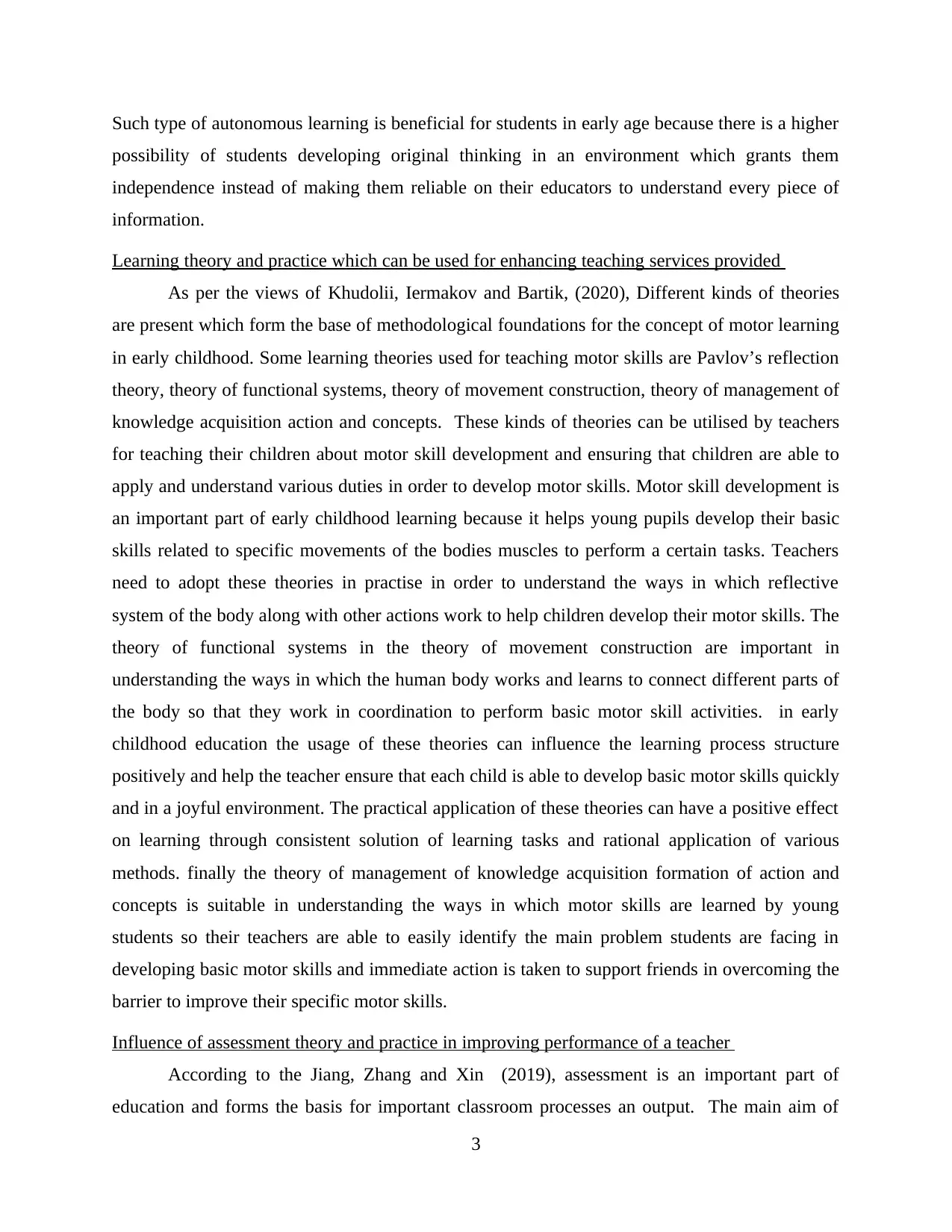
Such type of autonomous learning is beneficial for students in early age because there is a higher
possibility of students developing original thinking in an environment which grants them
independence instead of making them reliable on their educators to understand every piece of
information.
Learning theory and practice which can be used for enhancing teaching services provided
As per the views of Khudolii, Iermakov and Bartik, (2020), Different kinds of theories
are present which form the base of methodological foundations for the concept of motor learning
in early childhood. Some learning theories used for teaching motor skills are Pavlov’s reflection
theory, theory of functional systems, theory of movement construction, theory of management of
knowledge acquisition action and concepts. These kinds of theories can be utilised by teachers
for teaching their children about motor skill development and ensuring that children are able to
apply and understand various duties in order to develop motor skills. Motor skill development is
an important part of early childhood learning because it helps young pupils develop their basic
skills related to specific movements of the bodies muscles to perform a certain tasks. Teachers
need to adopt these theories in practise in order to understand the ways in which reflective
system of the body along with other actions work to help children develop their motor skills. The
theory of functional systems in the theory of movement construction are important in
understanding the ways in which the human body works and learns to connect different parts of
the body so that they work in coordination to perform basic motor skill activities. in early
childhood education the usage of these theories can influence the learning process structure
positively and help the teacher ensure that each child is able to develop basic motor skills quickly
and in a joyful environment. The practical application of these theories can have a positive effect
on learning through consistent solution of learning tasks and rational application of various
methods. finally the theory of management of knowledge acquisition formation of action and
concepts is suitable in understanding the ways in which motor skills are learned by young
students so their teachers are able to easily identify the main problem students are facing in
developing basic motor skills and immediate action is taken to support friends in overcoming the
barrier to improve their specific motor skills.
Influence of assessment theory and practice in improving performance of a teacher
According to the Jiang, Zhang and Xin (2019), assessment is an important part of
education and forms the basis for important classroom processes an output. The main aim of
3
possibility of students developing original thinking in an environment which grants them
independence instead of making them reliable on their educators to understand every piece of
information.
Learning theory and practice which can be used for enhancing teaching services provided
As per the views of Khudolii, Iermakov and Bartik, (2020), Different kinds of theories
are present which form the base of methodological foundations for the concept of motor learning
in early childhood. Some learning theories used for teaching motor skills are Pavlov’s reflection
theory, theory of functional systems, theory of movement construction, theory of management of
knowledge acquisition action and concepts. These kinds of theories can be utilised by teachers
for teaching their children about motor skill development and ensuring that children are able to
apply and understand various duties in order to develop motor skills. Motor skill development is
an important part of early childhood learning because it helps young pupils develop their basic
skills related to specific movements of the bodies muscles to perform a certain tasks. Teachers
need to adopt these theories in practise in order to understand the ways in which reflective
system of the body along with other actions work to help children develop their motor skills. The
theory of functional systems in the theory of movement construction are important in
understanding the ways in which the human body works and learns to connect different parts of
the body so that they work in coordination to perform basic motor skill activities. in early
childhood education the usage of these theories can influence the learning process structure
positively and help the teacher ensure that each child is able to develop basic motor skills quickly
and in a joyful environment. The practical application of these theories can have a positive effect
on learning through consistent solution of learning tasks and rational application of various
methods. finally the theory of management of knowledge acquisition formation of action and
concepts is suitable in understanding the ways in which motor skills are learned by young
students so their teachers are able to easily identify the main problem students are facing in
developing basic motor skills and immediate action is taken to support friends in overcoming the
barrier to improve their specific motor skills.
Influence of assessment theory and practice in improving performance of a teacher
According to the Jiang, Zhang and Xin (2019), assessment is an important part of
education and forms the basis for important classroom processes an output. The main aim of
3
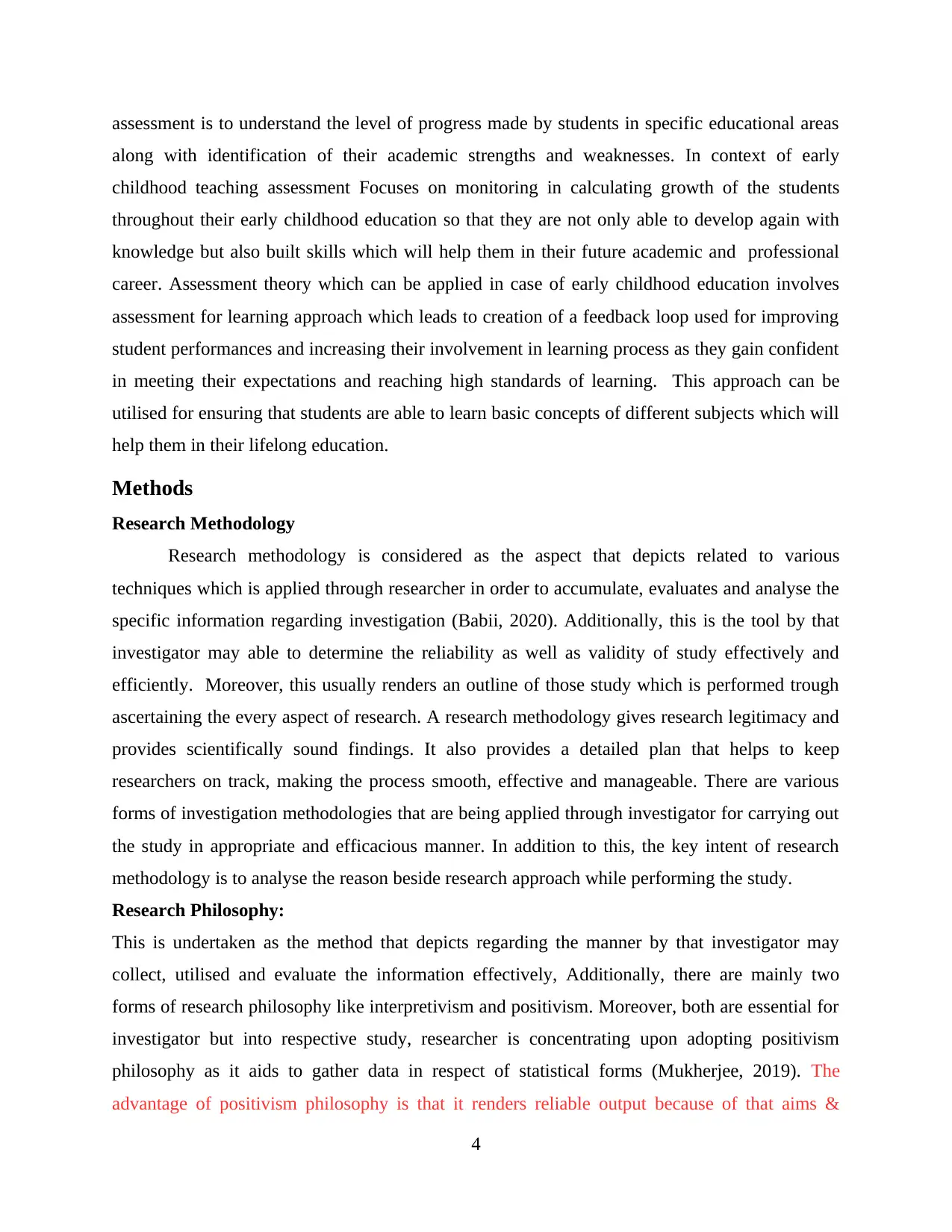
assessment is to understand the level of progress made by students in specific educational areas
along with identification of their academic strengths and weaknesses. In context of early
childhood teaching assessment Focuses on monitoring in calculating growth of the students
throughout their early childhood education so that they are not only able to develop again with
knowledge but also built skills which will help them in their future academic and professional
career. Assessment theory which can be applied in case of early childhood education involves
assessment for learning approach which leads to creation of a feedback loop used for improving
student performances and increasing their involvement in learning process as they gain confident
in meeting their expectations and reaching high standards of learning. This approach can be
utilised for ensuring that students are able to learn basic concepts of different subjects which will
help them in their lifelong education.
Methods
Research Methodology
Research methodology is considered as the aspect that depicts related to various
techniques which is applied through researcher in order to accumulate, evaluates and analyse the
specific information regarding investigation (Babii, 2020). Additionally, this is the tool by that
investigator may able to determine the reliability as well as validity of study effectively and
efficiently. Moreover, this usually renders an outline of those study which is performed trough
ascertaining the every aspect of research. A research methodology gives research legitimacy and
provides scientifically sound findings. It also provides a detailed plan that helps to keep
researchers on track, making the process smooth, effective and manageable. There are various
forms of investigation methodologies that are being applied through investigator for carrying out
the study in appropriate and efficacious manner. In addition to this, the key intent of research
methodology is to analyse the reason beside research approach while performing the study.
Research Philosophy:
This is undertaken as the method that depicts regarding the manner by that investigator may
collect, utilised and evaluate the information effectively, Additionally, there are mainly two
forms of research philosophy like interpretivism and positivism. Moreover, both are essential for
investigator but into respective study, researcher is concentrating upon adopting positivism
philosophy as it aids to gather data in respect of statistical forms (Mukherjee, 2019). The
advantage of positivism philosophy is that it renders reliable output because of that aims &
4
along with identification of their academic strengths and weaknesses. In context of early
childhood teaching assessment Focuses on monitoring in calculating growth of the students
throughout their early childhood education so that they are not only able to develop again with
knowledge but also built skills which will help them in their future academic and professional
career. Assessment theory which can be applied in case of early childhood education involves
assessment for learning approach which leads to creation of a feedback loop used for improving
student performances and increasing their involvement in learning process as they gain confident
in meeting their expectations and reaching high standards of learning. This approach can be
utilised for ensuring that students are able to learn basic concepts of different subjects which will
help them in their lifelong education.
Methods
Research Methodology
Research methodology is considered as the aspect that depicts related to various
techniques which is applied through researcher in order to accumulate, evaluates and analyse the
specific information regarding investigation (Babii, 2020). Additionally, this is the tool by that
investigator may able to determine the reliability as well as validity of study effectively and
efficiently. Moreover, this usually renders an outline of those study which is performed trough
ascertaining the every aspect of research. A research methodology gives research legitimacy and
provides scientifically sound findings. It also provides a detailed plan that helps to keep
researchers on track, making the process smooth, effective and manageable. There are various
forms of investigation methodologies that are being applied through investigator for carrying out
the study in appropriate and efficacious manner. In addition to this, the key intent of research
methodology is to analyse the reason beside research approach while performing the study.
Research Philosophy:
This is undertaken as the method that depicts regarding the manner by that investigator may
collect, utilised and evaluate the information effectively, Additionally, there are mainly two
forms of research philosophy like interpretivism and positivism. Moreover, both are essential for
investigator but into respective study, researcher is concentrating upon adopting positivism
philosophy as it aids to gather data in respect of statistical forms (Mukherjee, 2019). The
advantage of positivism philosophy is that it renders reliable output because of that aims &
4
⊘ This is a preview!⊘
Do you want full access?
Subscribe today to unlock all pages.

Trusted by 1+ million students worldwide
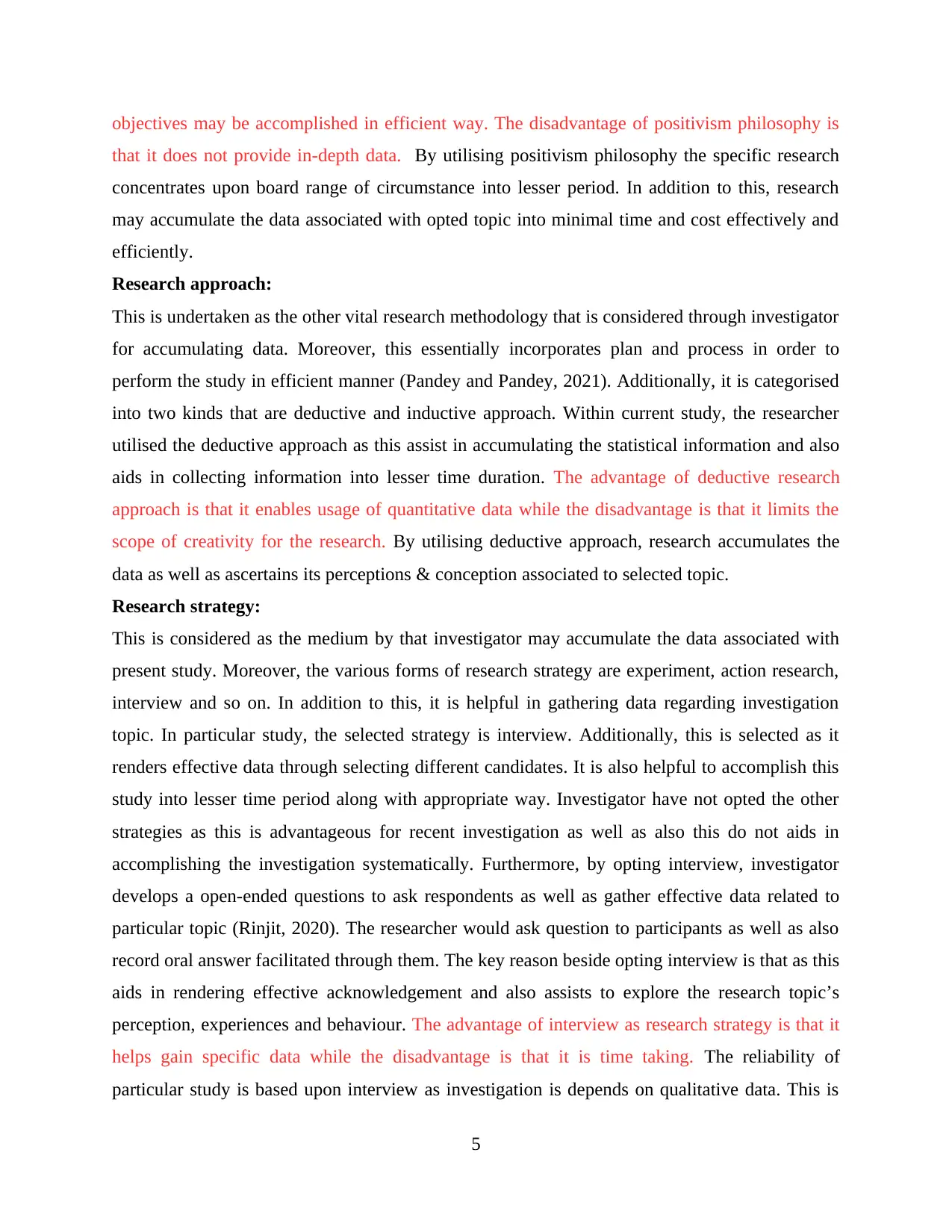
objectives may be accomplished in efficient way. The disadvantage of positivism philosophy is
that it does not provide in-depth data. By utilising positivism philosophy the specific research
concentrates upon board range of circumstance into lesser period. In addition to this, research
may accumulate the data associated with opted topic into minimal time and cost effectively and
efficiently.
Research approach:
This is undertaken as the other vital research methodology that is considered through investigator
for accumulating data. Moreover, this essentially incorporates plan and process in order to
perform the study in efficient manner (Pandey and Pandey, 2021). Additionally, it is categorised
into two kinds that are deductive and inductive approach. Within current study, the researcher
utilised the deductive approach as this assist in accumulating the statistical information and also
aids in collecting information into lesser time duration. The advantage of deductive research
approach is that it enables usage of quantitative data while the disadvantage is that it limits the
scope of creativity for the research. By utilising deductive approach, research accumulates the
data as well as ascertains its perceptions & conception associated to selected topic.
Research strategy:
This is considered as the medium by that investigator may accumulate the data associated with
present study. Moreover, the various forms of research strategy are experiment, action research,
interview and so on. In addition to this, it is helpful in gathering data regarding investigation
topic. In particular study, the selected strategy is interview. Additionally, this is selected as it
renders effective data through selecting different candidates. It is also helpful to accomplish this
study into lesser time period along with appropriate way. Investigator have not opted the other
strategies as this is advantageous for recent investigation as well as also this do not aids in
accomplishing the investigation systematically. Furthermore, by opting interview, investigator
develops a open-ended questions to ask respondents as well as gather effective data related to
particular topic (Rinjit, 2020). The researcher would ask question to participants as well as also
record oral answer facilitated through them. The key reason beside opting interview is that as this
aids in rendering effective acknowledgement and also assists to explore the research topic’s
perception, experiences and behaviour. The advantage of interview as research strategy is that it
helps gain specific data while the disadvantage is that it is time taking. The reliability of
particular study is based upon interview as investigation is depends on qualitative data. This is
5
that it does not provide in-depth data. By utilising positivism philosophy the specific research
concentrates upon board range of circumstance into lesser period. In addition to this, research
may accumulate the data associated with opted topic into minimal time and cost effectively and
efficiently.
Research approach:
This is undertaken as the other vital research methodology that is considered through investigator
for accumulating data. Moreover, this essentially incorporates plan and process in order to
perform the study in efficient manner (Pandey and Pandey, 2021). Additionally, it is categorised
into two kinds that are deductive and inductive approach. Within current study, the researcher
utilised the deductive approach as this assist in accumulating the statistical information and also
aids in collecting information into lesser time duration. The advantage of deductive research
approach is that it enables usage of quantitative data while the disadvantage is that it limits the
scope of creativity for the research. By utilising deductive approach, research accumulates the
data as well as ascertains its perceptions & conception associated to selected topic.
Research strategy:
This is considered as the medium by that investigator may accumulate the data associated with
present study. Moreover, the various forms of research strategy are experiment, action research,
interview and so on. In addition to this, it is helpful in gathering data regarding investigation
topic. In particular study, the selected strategy is interview. Additionally, this is selected as it
renders effective data through selecting different candidates. It is also helpful to accomplish this
study into lesser time period along with appropriate way. Investigator have not opted the other
strategies as this is advantageous for recent investigation as well as also this do not aids in
accomplishing the investigation systematically. Furthermore, by opting interview, investigator
develops a open-ended questions to ask respondents as well as gather effective data related to
particular topic (Rinjit, 2020). The researcher would ask question to participants as well as also
record oral answer facilitated through them. The key reason beside opting interview is that as this
aids in rendering effective acknowledgement and also assists to explore the research topic’s
perception, experiences and behaviour. The advantage of interview as research strategy is that it
helps gain specific data while the disadvantage is that it is time taking. The reliability of
particular study is based upon interview as investigation is depends on qualitative data. This is
5
Paraphrase This Document
Need a fresh take? Get an instant paraphrase of this document with our AI Paraphraser
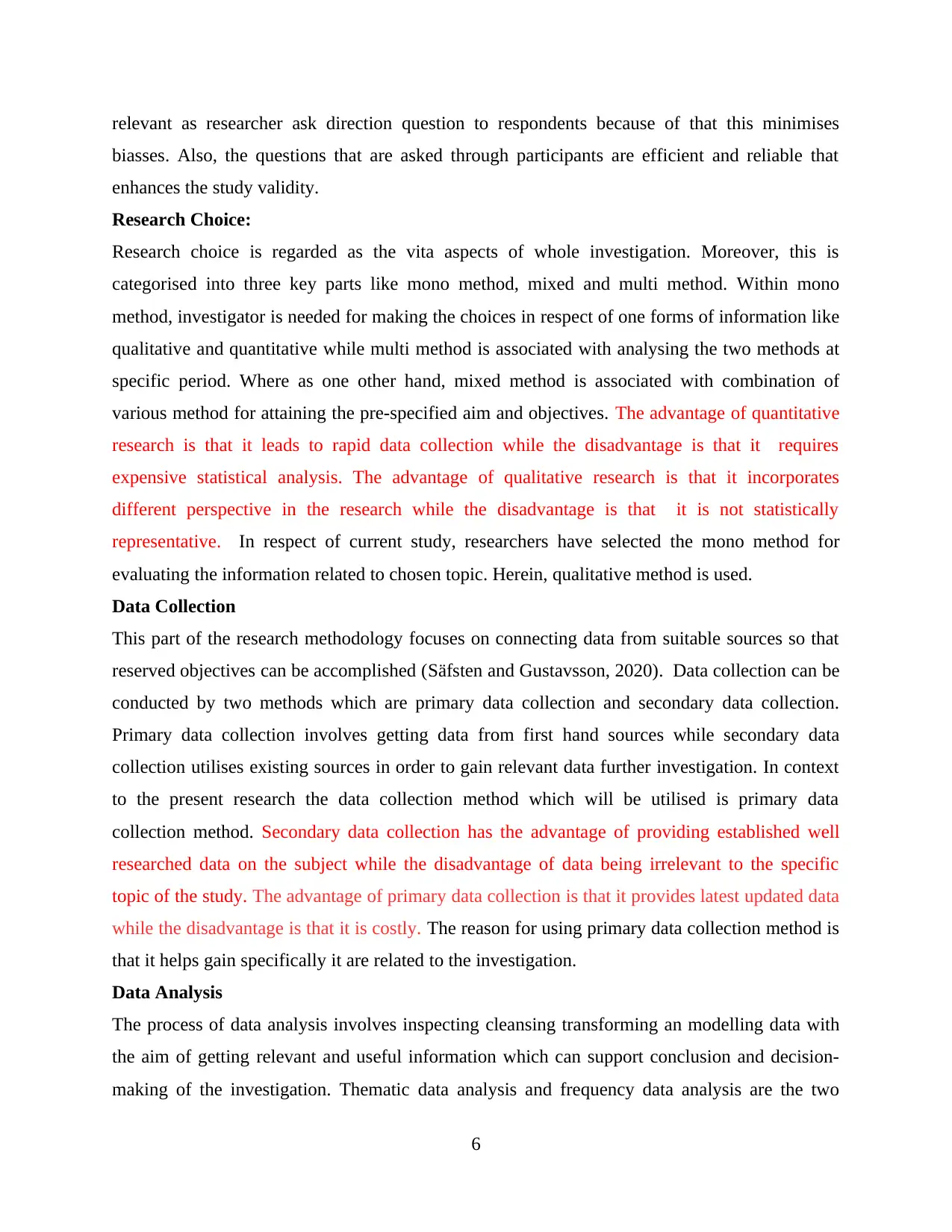
relevant as researcher ask direction question to respondents because of that this minimises
biasses. Also, the questions that are asked through participants are efficient and reliable that
enhances the study validity.
Research Choice:
Research choice is regarded as the vita aspects of whole investigation. Moreover, this is
categorised into three key parts like mono method, mixed and multi method. Within mono
method, investigator is needed for making the choices in respect of one forms of information like
qualitative and quantitative while multi method is associated with analysing the two methods at
specific period. Where as one other hand, mixed method is associated with combination of
various method for attaining the pre-specified aim and objectives. The advantage of quantitative
research is that it leads to rapid data collection while the disadvantage is that it requires
expensive statistical analysis. The advantage of qualitative research is that it incorporates
different perspective in the research while the disadvantage is that it is not statistically
representative. In respect of current study, researchers have selected the mono method for
evaluating the information related to chosen topic. Herein, qualitative method is used.
Data Collection
This part of the research methodology focuses on connecting data from suitable sources so that
reserved objectives can be accomplished (Säfsten and Gustavsson, 2020). Data collection can be
conducted by two methods which are primary data collection and secondary data collection.
Primary data collection involves getting data from first hand sources while secondary data
collection utilises existing sources in order to gain relevant data further investigation. In context
to the present research the data collection method which will be utilised is primary data
collection method. Secondary data collection has the advantage of providing established well
researched data on the subject while the disadvantage of data being irrelevant to the specific
topic of the study. The advantage of primary data collection is that it provides latest updated data
while the disadvantage is that it is costly. The reason for using primary data collection method is
that it helps gain specifically it are related to the investigation.
Data Analysis
The process of data analysis involves inspecting cleansing transforming an modelling data with
the aim of getting relevant and useful information which can support conclusion and decision-
making of the investigation. Thematic data analysis and frequency data analysis are the two
6
biasses. Also, the questions that are asked through participants are efficient and reliable that
enhances the study validity.
Research Choice:
Research choice is regarded as the vita aspects of whole investigation. Moreover, this is
categorised into three key parts like mono method, mixed and multi method. Within mono
method, investigator is needed for making the choices in respect of one forms of information like
qualitative and quantitative while multi method is associated with analysing the two methods at
specific period. Where as one other hand, mixed method is associated with combination of
various method for attaining the pre-specified aim and objectives. The advantage of quantitative
research is that it leads to rapid data collection while the disadvantage is that it requires
expensive statistical analysis. The advantage of qualitative research is that it incorporates
different perspective in the research while the disadvantage is that it is not statistically
representative. In respect of current study, researchers have selected the mono method for
evaluating the information related to chosen topic. Herein, qualitative method is used.
Data Collection
This part of the research methodology focuses on connecting data from suitable sources so that
reserved objectives can be accomplished (Säfsten and Gustavsson, 2020). Data collection can be
conducted by two methods which are primary data collection and secondary data collection.
Primary data collection involves getting data from first hand sources while secondary data
collection utilises existing sources in order to gain relevant data further investigation. In context
to the present research the data collection method which will be utilised is primary data
collection method. Secondary data collection has the advantage of providing established well
researched data on the subject while the disadvantage of data being irrelevant to the specific
topic of the study. The advantage of primary data collection is that it provides latest updated data
while the disadvantage is that it is costly. The reason for using primary data collection method is
that it helps gain specifically it are related to the investigation.
Data Analysis
The process of data analysis involves inspecting cleansing transforming an modelling data with
the aim of getting relevant and useful information which can support conclusion and decision-
making of the investigation. Thematic data analysis and frequency data analysis are the two
6
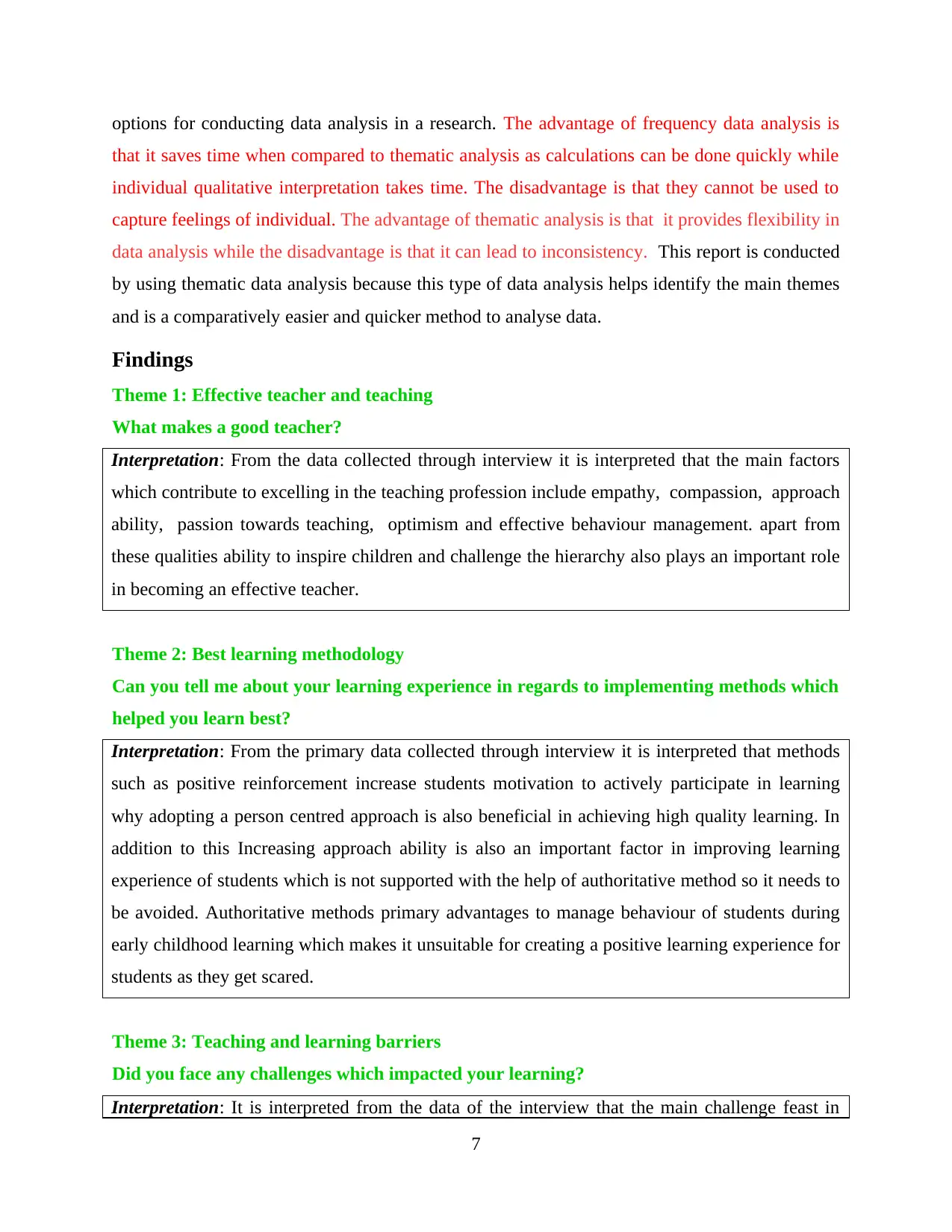
options for conducting data analysis in a research. The advantage of frequency data analysis is
that it saves time when compared to thematic analysis as calculations can be done quickly while
individual qualitative interpretation takes time. The disadvantage is that they cannot be used to
capture feelings of individual. The advantage of thematic analysis is that it provides flexibility in
data analysis while the disadvantage is that it can lead to inconsistency. This report is conducted
by using thematic data analysis because this type of data analysis helps identify the main themes
and is a comparatively easier and quicker method to analyse data.
Findings
Theme 1: Effective teacher and teaching
What makes a good teacher?
Interpretation: From the data collected through interview it is interpreted that the main factors
which contribute to excelling in the teaching profession include empathy, compassion, approach
ability, passion towards teaching, optimism and effective behaviour management. apart from
these qualities ability to inspire children and challenge the hierarchy also plays an important role
in becoming an effective teacher.
Theme 2: Best learning methodology
Can you tell me about your learning experience in regards to implementing methods which
helped you learn best?
Interpretation: From the primary data collected through interview it is interpreted that methods
such as positive reinforcement increase students motivation to actively participate in learning
why adopting a person centred approach is also beneficial in achieving high quality learning. In
addition to this Increasing approach ability is also an important factor in improving learning
experience of students which is not supported with the help of authoritative method so it needs to
be avoided. Authoritative methods primary advantages to manage behaviour of students during
early childhood learning which makes it unsuitable for creating a positive learning experience for
students as they get scared.
Theme 3: Teaching and learning barriers
Did you face any challenges which impacted your learning?
Interpretation: It is interpreted from the data of the interview that the main challenge feast in
7
that it saves time when compared to thematic analysis as calculations can be done quickly while
individual qualitative interpretation takes time. The disadvantage is that they cannot be used to
capture feelings of individual. The advantage of thematic analysis is that it provides flexibility in
data analysis while the disadvantage is that it can lead to inconsistency. This report is conducted
by using thematic data analysis because this type of data analysis helps identify the main themes
and is a comparatively easier and quicker method to analyse data.
Findings
Theme 1: Effective teacher and teaching
What makes a good teacher?
Interpretation: From the data collected through interview it is interpreted that the main factors
which contribute to excelling in the teaching profession include empathy, compassion, approach
ability, passion towards teaching, optimism and effective behaviour management. apart from
these qualities ability to inspire children and challenge the hierarchy also plays an important role
in becoming an effective teacher.
Theme 2: Best learning methodology
Can you tell me about your learning experience in regards to implementing methods which
helped you learn best?
Interpretation: From the primary data collected through interview it is interpreted that methods
such as positive reinforcement increase students motivation to actively participate in learning
why adopting a person centred approach is also beneficial in achieving high quality learning. In
addition to this Increasing approach ability is also an important factor in improving learning
experience of students which is not supported with the help of authoritative method so it needs to
be avoided. Authoritative methods primary advantages to manage behaviour of students during
early childhood learning which makes it unsuitable for creating a positive learning experience for
students as they get scared.
Theme 3: Teaching and learning barriers
Did you face any challenges which impacted your learning?
Interpretation: It is interpreted from the data of the interview that the main challenge feast in
7
⊘ This is a preview!⊘
Do you want full access?
Subscribe today to unlock all pages.

Trusted by 1+ million students worldwide
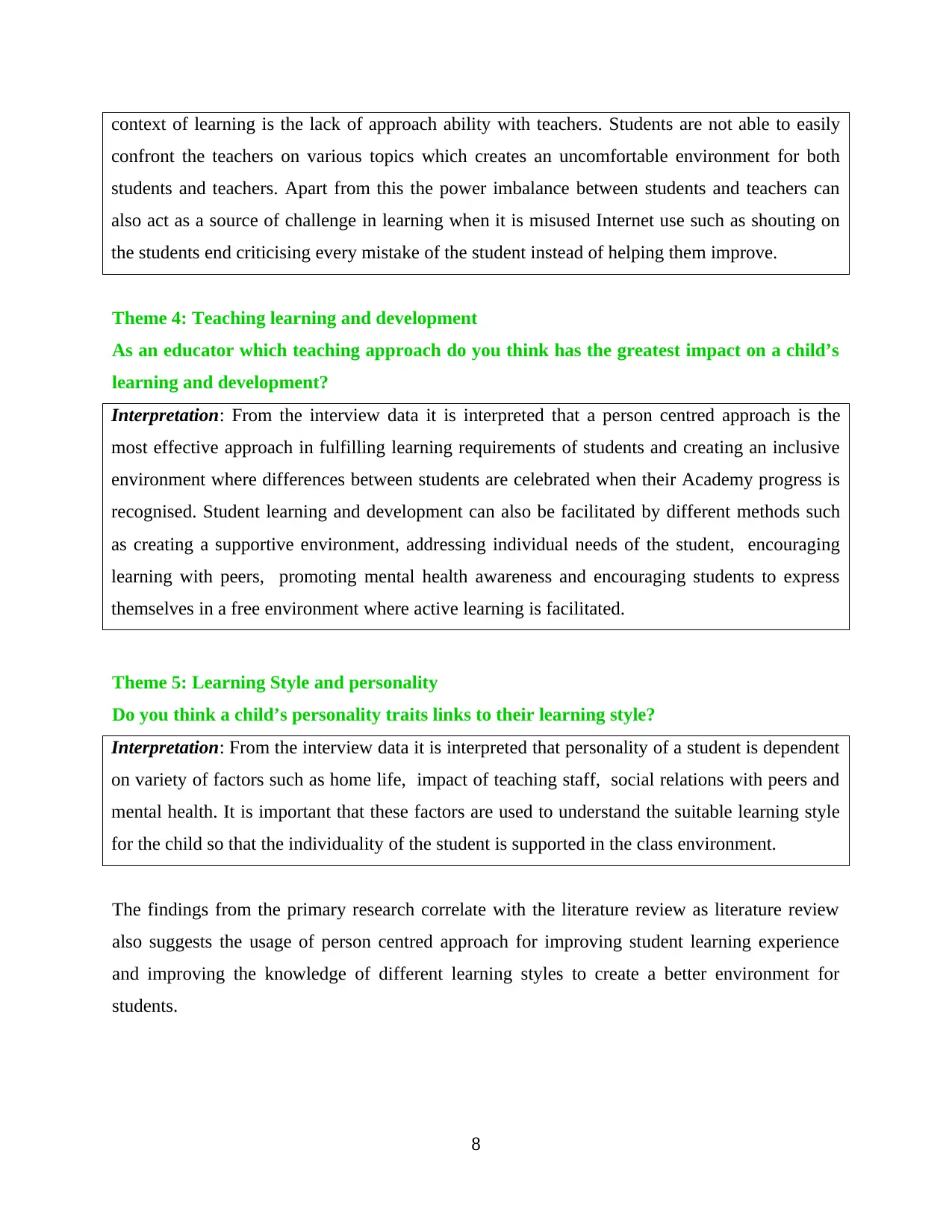
context of learning is the lack of approach ability with teachers. Students are not able to easily
confront the teachers on various topics which creates an uncomfortable environment for both
students and teachers. Apart from this the power imbalance between students and teachers can
also act as a source of challenge in learning when it is misused Internet use such as shouting on
the students end criticising every mistake of the student instead of helping them improve.
Theme 4: Teaching learning and development
As an educator which teaching approach do you think has the greatest impact on a child’s
learning and development?
Interpretation: From the interview data it is interpreted that a person centred approach is the
most effective approach in fulfilling learning requirements of students and creating an inclusive
environment where differences between students are celebrated when their Academy progress is
recognised. Student learning and development can also be facilitated by different methods such
as creating a supportive environment, addressing individual needs of the student, encouraging
learning with peers, promoting mental health awareness and encouraging students to express
themselves in a free environment where active learning is facilitated.
Theme 5: Learning Style and personality
Do you think a child’s personality traits links to their learning style?
Interpretation: From the interview data it is interpreted that personality of a student is dependent
on variety of factors such as home life, impact of teaching staff, social relations with peers and
mental health. It is important that these factors are used to understand the suitable learning style
for the child so that the individuality of the student is supported in the class environment.
The findings from the primary research correlate with the literature review as literature review
also suggests the usage of person centred approach for improving student learning experience
and improving the knowledge of different learning styles to create a better environment for
students.
8
confront the teachers on various topics which creates an uncomfortable environment for both
students and teachers. Apart from this the power imbalance between students and teachers can
also act as a source of challenge in learning when it is misused Internet use such as shouting on
the students end criticising every mistake of the student instead of helping them improve.
Theme 4: Teaching learning and development
As an educator which teaching approach do you think has the greatest impact on a child’s
learning and development?
Interpretation: From the interview data it is interpreted that a person centred approach is the
most effective approach in fulfilling learning requirements of students and creating an inclusive
environment where differences between students are celebrated when their Academy progress is
recognised. Student learning and development can also be facilitated by different methods such
as creating a supportive environment, addressing individual needs of the student, encouraging
learning with peers, promoting mental health awareness and encouraging students to express
themselves in a free environment where active learning is facilitated.
Theme 5: Learning Style and personality
Do you think a child’s personality traits links to their learning style?
Interpretation: From the interview data it is interpreted that personality of a student is dependent
on variety of factors such as home life, impact of teaching staff, social relations with peers and
mental health. It is important that these factors are used to understand the suitable learning style
for the child so that the individuality of the student is supported in the class environment.
The findings from the primary research correlate with the literature review as literature review
also suggests the usage of person centred approach for improving student learning experience
and improving the knowledge of different learning styles to create a better environment for
students.
8
Paraphrase This Document
Need a fresh take? Get an instant paraphrase of this document with our AI Paraphraser

9
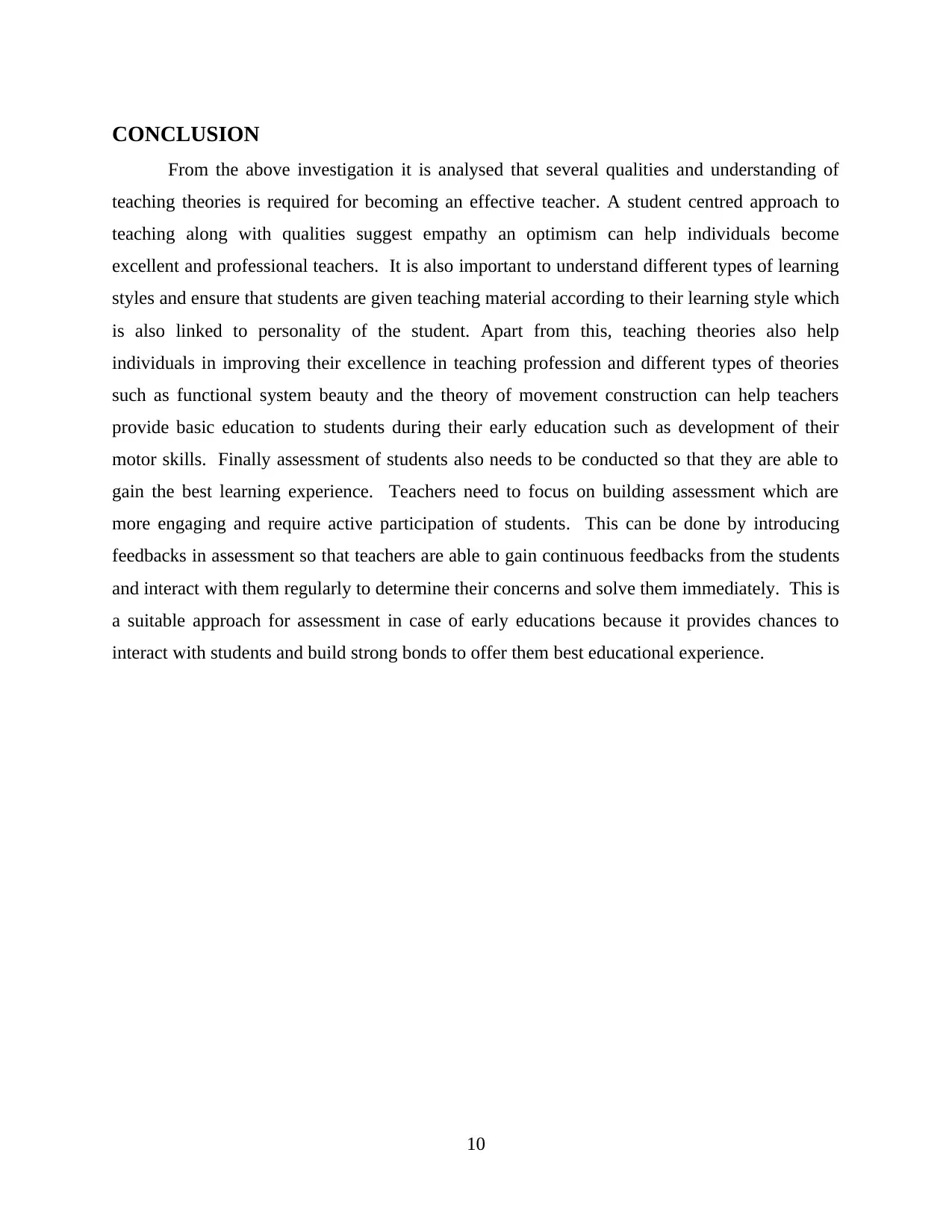
CONCLUSION
From the above investigation it is analysed that several qualities and understanding of
teaching theories is required for becoming an effective teacher. A student centred approach to
teaching along with qualities suggest empathy an optimism can help individuals become
excellent and professional teachers. It is also important to understand different types of learning
styles and ensure that students are given teaching material according to their learning style which
is also linked to personality of the student. Apart from this, teaching theories also help
individuals in improving their excellence in teaching profession and different types of theories
such as functional system beauty and the theory of movement construction can help teachers
provide basic education to students during their early education such as development of their
motor skills. Finally assessment of students also needs to be conducted so that they are able to
gain the best learning experience. Teachers need to focus on building assessment which are
more engaging and require active participation of students. This can be done by introducing
feedbacks in assessment so that teachers are able to gain continuous feedbacks from the students
and interact with them regularly to determine their concerns and solve them immediately. This is
a suitable approach for assessment in case of early educations because it provides chances to
interact with students and build strong bonds to offer them best educational experience.
10
From the above investigation it is analysed that several qualities and understanding of
teaching theories is required for becoming an effective teacher. A student centred approach to
teaching along with qualities suggest empathy an optimism can help individuals become
excellent and professional teachers. It is also important to understand different types of learning
styles and ensure that students are given teaching material according to their learning style which
is also linked to personality of the student. Apart from this, teaching theories also help
individuals in improving their excellence in teaching profession and different types of theories
such as functional system beauty and the theory of movement construction can help teachers
provide basic education to students during their early education such as development of their
motor skills. Finally assessment of students also needs to be conducted so that they are able to
gain the best learning experience. Teachers need to focus on building assessment which are
more engaging and require active participation of students. This can be done by introducing
feedbacks in assessment so that teachers are able to gain continuous feedbacks from the students
and interact with them regularly to determine their concerns and solve them immediately. This is
a suitable approach for assessment in case of early educations because it provides chances to
interact with students and build strong bonds to offer them best educational experience.
10
⊘ This is a preview!⊘
Do you want full access?
Subscribe today to unlock all pages.

Trusted by 1+ million students worldwide
1 out of 14
Related Documents
Your All-in-One AI-Powered Toolkit for Academic Success.
+13062052269
info@desklib.com
Available 24*7 on WhatsApp / Email
![[object Object]](/_next/static/media/star-bottom.7253800d.svg)
Unlock your academic potential
Copyright © 2020–2026 A2Z Services. All Rights Reserved. Developed and managed by ZUCOL.





